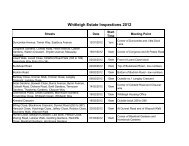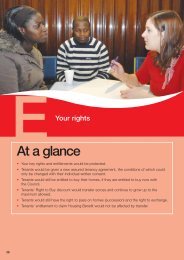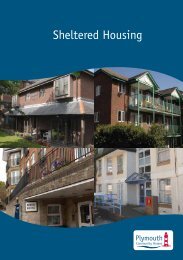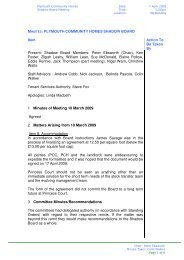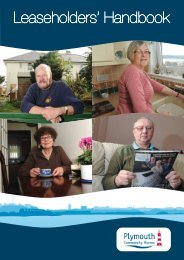Plymouth Community Homes Tenancy Allocation Policy Including ...
Plymouth Community Homes Tenancy Allocation Policy Including ...
Plymouth Community Homes Tenancy Allocation Policy Including ...
Create successful ePaper yourself
Turn your PDF publications into a flip-book with our unique Google optimized e-Paper software.
<strong>Plymouth</strong> <strong>Community</strong> <strong>Homes</strong><br />
<strong>Tenancy</strong> <strong>Allocation</strong> <strong>Policy</strong><br />
<strong>Including</strong> mutual exchange,<br />
succession and assignment<br />
Version 1.4 / August 2012
<strong>Plymouth</strong> <strong>Community</strong> <strong>Homes</strong><br />
<strong>Tenancy</strong> <strong>Allocation</strong> <strong>Policy</strong><br />
Purpose<br />
This policy outlines the <strong>Plymouth</strong> <strong>Community</strong> <strong>Homes</strong> (PCH) approach to letting<br />
homes and dealing with transfers within the stock. PCH aims to treat prospective and<br />
existing tenants in a way which is fair, consistent and accountable whilst ensuring<br />
that best use is made of the available housing stock.<br />
Definitions<br />
‘<strong>Allocation</strong>s’ - the process providing new tenancies to successful applicants for<br />
housing.<br />
‘Transfers’ - requests from existing tenants who wish to move from their PCH<br />
property to another PCH property or to a property managed by another Registered<br />
Social Landlord.<br />
‘Devon Home Choice’ - the new choice-based system of assessing housing need<br />
and allocating properties that is being adopted by RSLs and Local Authorities across<br />
the County of Devon from December 2009.<br />
‘Succession’ – the transfer of a tenancy (not a property) to a qualifying person<br />
following the death of the tenant.<br />
‘Assignment’ – the transfer of a tenancy (not a property) to a qualifying person by a<br />
still living tenant.<br />
‘Spouse’ – a husband or wife.<br />
‘Civil Partnership’– a legal union between couples of the same sex (available from<br />
21 December 2005).<br />
‘Statutory’ – a right granted by act/s of legislation and not subject to the consent of<br />
the landlord.<br />
‘Contractual’ – a right granted by a contract (tenancy agreement) between the<br />
tenant/s and landlord.<br />
‘Immediate Family’ – parent (including step), child (including step), partner (of either<br />
sex), sibling, uncle, aunt, niece or nephew. Also unrelated full time carers of the<br />
tenant who reside permanently at the premises can be identified as a family member.<br />
<strong>Policy</strong> sections<br />
Page<br />
1 Devon Home Choice 4<br />
2 Sheltered and other older persons’ housing 5<br />
3 Transfers 7<br />
4 Local lettings plans and sensitive lets 9<br />
5 Succession 9<br />
6 Assignment 10<br />
7 PCH charitable status 10<br />
8 Mutual exchanges 10<br />
9 Equality and diversity 11<br />
10 Review and monitoring 11
1. Devon Home Choice<br />
1.1 PCH has opted to join the Devon Home Choice scheme to be our main system of<br />
allocating properties. Devon Home Choice is a choice-based letting (CBL) scheme<br />
that will cover the whole of Devon. The aims of the scheme are:<br />
To provide choice for people seeking housing and the ability to move within<br />
Devon<br />
To develop a common scheme across Devon that is transparent, easy to<br />
understand and accessible to all<br />
1.2 The Devon Home Choice policy explains how local authority and housing<br />
association homes across Devon will be let. The <strong>Policy</strong> sets out:<br />
How to apply for housing<br />
Who is eligible for housing<br />
How applicants will be assessed and prioritized<br />
All applications are assessed in the same way, using the rules to ensure fairness<br />
and consistency.<br />
1.3 Under Devon Home Choice there will be a common:<br />
Application form<br />
Housing register<br />
Approach to assessing housing need and awarding priority<br />
Approach to advertising available properties<br />
1.4 PCH will:<br />
Advertise all available general needs and sheltered housing homes in <strong>Plymouth</strong><br />
through Devon Home Choice<br />
Support and apply the Devon Home Choice <strong>Policy</strong><br />
Ensure staff are fully trained in accordance with the Devon Home Choice policy<br />
and procedures<br />
Ensure that its policy does not inhibit transparency and equal access<br />
Label homes in line with the agreed procedures within Devon Home Choice<br />
Contribute to the continuous improvement and advancement of Devon Home<br />
Choice, including participating in project work as necessary<br />
Promote the scheme to our own tenants and applicants<br />
Where a home is proving difficult to let, it may be re-advertised with wider<br />
eligibility criteria. If this is still not successful, PCH may market such homes<br />
outside Devon Home Choice to let them as soon as possible.<br />
1.5 Local authorities (including <strong>Plymouth</strong> City Council) will have the main role in<br />
handling applications to join the Devon Home Choice Housing Register.<br />
1.6 PCH will be expected to support applicants in applying to join the Devon Home<br />
Choice housing register<br />
1.7 When a property is advertised, PCH can label the property to state who is eligible<br />
to bid for it. Labelling must be in line with the Devon Home Choice policy and<br />
procedures, and be verified by the local authority where the property is located. This<br />
will ensure that any local conditions (such as local <strong>Allocation</strong> policies, Section 106<br />
agreements) are complied with.
1.8 <strong>Homes</strong> can be labelled to state:<br />
The household size the property is suitable for<br />
Any age restrictions on the property<br />
Any relevant local connection criteria on the property<br />
If a local lettings policy is in place<br />
Any adaptations to the property, and any mobility criteria that apply<br />
Any restrictions on pets<br />
Any groups of applicants that are being given preference for the property.<br />
This may be as a result of PCH’s own policies or following a request from a<br />
local authority<br />
1.9 Please see the Devon Home Choice <strong>Policy</strong> for details.<br />
2. Sheltered and older persons’ housing<br />
2.1 <strong>Plymouth</strong> <strong>Community</strong> <strong>Homes</strong> (PCH) has a range of different types of housing<br />
specifically designed for older people, usually those aged 60 years and over.<br />
<br />
<br />
Sheltered housing schemes – this accommodation has staff based on site to<br />
support and assist tenants, a 24-hour emergency alarm system, and generally,<br />
communal facilities. Some sheltered schemes have been extended to include<br />
bungalows in the near vicinity. PCH has 439 homes for rent in this category,<br />
comprising 284 flats and 155 bungalows.<br />
Older persons’ bungalows – these are mostly linked to the alarm system through<br />
which residents can receive assistance in the event of an emergency. These<br />
homes will, very occasionally, be used to meet a specific need from an applicant<br />
under the age of 60. PCH has 1,248 such homes for rent.<br />
2.2 The alarm system is operated by an independent organisation, CarelineUK, who<br />
provide a highly regarded service of routine checks and emergency responses. PCH<br />
is one of numerous providers of specialist housing that have contracted with<br />
CarelineUK for this service.<br />
2.3 PCH does not currently have any ‘extra care’ schemes, which provide homes for<br />
frail older residents who have significantly higher support needs. There are, however,<br />
a number of such schemes in <strong>Plymouth</strong> which are owned by other social landlords.<br />
2.4 Demand for PCH’s sheltered housing and older persons’ bungalows far exceeds<br />
supply, though it can sometimes be difficult to find new tenants for smaller sheltered<br />
bedsits and bungalows which have poor access.<br />
Allocating sheltered housing and bungalows<br />
2.5 People who wish to express a desire to move into sheltered housing or an older<br />
person’s bungalow owned by a social landlord in <strong>Plymouth</strong> must apply to go onto the<br />
Council’s Housing Register. From December 2009 this is managed as part of Devon<br />
Home Choice, the Devon-wide choice-based letting scheme covering all areas and<br />
all significant registered social landlords.<br />
2.6 Applicants will be sent information by the Council about eligibility for sheltered<br />
housing in <strong>Plymouth</strong> along with an application form. Applicants will be required to<br />
complete a self assessment form as part of this process, which will identify whether<br />
they are likely to meet the support needs requirements of PCH
2.7 Although anyone can apply, only applicants with a clear, demonstrable need for<br />
sheltered or older persons’ accommodation will be housed through the Register.<br />
2.8 To be eligible for PCH sheltered housing, applicants must be over 60 years of<br />
age, or 55 and over if registered disabled and/or in receipt of Disability Living<br />
Allowance. Other factors that will be taken into account when assessing applicants'<br />
suitability for sheltered housing include:-<br />
All applicants - the applicant’s need for support and wish for sheltered housing<br />
Owner occupiers – the amount of financial equity they have in their home (see the<br />
section below on financial circumstances).<br />
Financial resources of applicants<br />
2.9 The financial resources of applicants will be taken into account when the initial<br />
eligibility assessment is undertaken. PCH will not accept applicants with assets<br />
(property or savings) in excess of £180,000. It is felt that applicants with more than<br />
this can generally meet their needs through private sector sheltered housing<br />
providers, such as McCarthy and Stone. Other registered social landlords with<br />
sheltered housing may operate different equity levels locally.<br />
Prioritisation of applicants<br />
2.10 If an applicant meets the criteria for sheltered housing, their application will be<br />
assessed and prioritised based on their housing need. This may involve the<br />
consideration of the application by the Council’s older persons’ special needs<br />
housing panel.<br />
2.11 The support need will be the primary factor in deciding an application’s ranking<br />
against other competing applications, taking into account any pressing housing need.<br />
2.12 The secondary factor in ranking competing applications will be the length of time<br />
that the application has been placed in its priority group<br />
Bidding for sheltered housing<br />
2.13 In common with applicants for other types of housing, those wanting sheltered<br />
housing are required to ‘bid’ for homes that they want to be considered for through<br />
Devon Home Choice. It is understood that this might be difficult for some applicants,<br />
and assistance and support is available with bidding to ensure that these people are<br />
not disadvantaged.<br />
Confirmation of eligibility<br />
2.14 Following a successful bid and prior to the offer of accommodation, the<br />
applicant will be visited by a PCH Sheltered Housing Officer who will verify their<br />
support needs and other application details. They will also complete a pre-tenancy<br />
support plan with the applicant.<br />
2.15 An offer may not be made, or may even be withdrawn, if the support needs of<br />
the applicant are such that PCH deems that the applicant will be unable to maintain<br />
an independent tenancy. In these circumstances, it may, though, be possible to<br />
proceed if a tailored care package or floating support can be organised to ensure that<br />
the tenancy is likely to be successfully maintained.
Priority levels that can be awarded to applicants<br />
2.16 1. Urgent priority (A)<br />
This is the highest level of priority and is awarded where there is:<br />
an urgent need for support and the client’s independent living is at risk<br />
a risk of homelessness<br />
re-housing is required due to demolition or regeneration works in an area.<br />
2.17 2. High priority (B)<br />
This is awarded where the client has been assessed as housebound, or they are<br />
suffering high levels of isolation, or their independent living is at risk.<br />
2.18 3. Medium priority (C)<br />
This level of priority can be awarded where there is low support needs and no risk to<br />
the client in their current home.<br />
2.19 4. Low priority (D)<br />
All other applications which have a support need, but which do not fall within the<br />
above categories, will have this ranking. Within this category the length of time of the<br />
application or the length of time at their current address will determine their position.<br />
Applications showing a support and housing need, but where the applicant’s financial<br />
resources exceed the limit, will also be placed in this band.<br />
2.20 5. No Need (E)<br />
This will be for applications which do not have any support need.<br />
Local Letting Initiatives<br />
2.21 Local Letting Initiatives (LLI) will be developed from time to time to enable<br />
specific sustainability issues to be addressed. For example, an LLI may be needed<br />
where there is low demand for a particular area or property type. All LLls will be<br />
approved by the Head of Housing Choices. Applicants will be informed of any LLIs in<br />
the applicant information pack.<br />
Mutual exchanges to and from sheltered housing<br />
2.22 The criteria for acceptance of applications for a mutual exchange involving a<br />
sheltered housing unit, along with the process to be followed, are detailed in PCH’s<br />
<strong>Allocation</strong>s <strong>Policy</strong>.<br />
3. Offers of accommodation<br />
3.1 All offers of accommodation will be subject to satisfactory verification of<br />
applicants’ eligibility, housing need and identity. All offers made will be provisional<br />
until confirmed. PCH reserves the right to not proceed with an offer where there is<br />
insufficient evidence to support an application, there has been a previous or current<br />
history of tenancy breaches or any offered tenancy is likely not to be sustainable.<br />
3.2 Where an applicant is made an offer which is then subsequently withdrawn, for<br />
example following verification, eligibility or other checks, we will notify the applicant in<br />
writing of the decision and include the reasons why the offer will not proceed. We will<br />
advise them how they can have this decision reviewed.
3.3 Applicants have the right to ask for a review of any decision relating to their<br />
application for an offer of accommodation with PCH. Requests for a review should be<br />
put in writing, within 7 calendar days of the date of the decision letter, advising the<br />
reasons for the request. The review will be undertaken by an officer of PCH<br />
independent of the original decision. The review request will be responded to in<br />
writing within 21 calendar days.<br />
4. Transfers<br />
4.1 Transfer applications are given priority for allocation of housing on the same<br />
basis as other Devon Home Choice applications, each application being awarded a<br />
banding priority according to housing need. This takes into consideration both the<br />
statutory requirement to give reasonable preference to particular groups, and the<br />
locally established additional preferences.<br />
4.2 It is anticipated that a proportion of properties available for letting will be allocated<br />
to existing tenants seeking to transfer. This will ensure over time that a reasonable<br />
balance will be struck between the statutory duties of the Council, the needs of the<br />
wider community, and the aspirations of existing tenants.<br />
4.3 No transfer offer will be made unless the transfer applicants have conducted their<br />
tenancy in a reasonable manner over the preceding six months, or 12 months for<br />
demoted tenancies. This would usually include having maintained a rent account that<br />
has not fallen into arrears and there not being evidence of nuisance or anti-social<br />
behaviour relating to the tenancy.<br />
4.4 In applying this provision, care will be taken to ensure that previous arrears<br />
arising out of circumstances beyond the tenant’s control should not prejudice the<br />
right to consideration of transfer, taking all individual circumstances into account.<br />
4.5 Before a transfer offer of alternative accommodation can be confirmed the current<br />
property will be inspected to ensure that the property has been maintained by the<br />
tenant to an acceptable standard and that there is no damage beyond fair ‘wear and<br />
tear’.<br />
4.6 For a property to be eligible to be placed on the transfer register, it will need to<br />
meet the following criteria. These standards are also applicable for a notice to quit.<br />
Good decorative order.<br />
All damages caused by the tenants, their family or guest, will be the<br />
responsibility of that tenant to repair.<br />
Alterations - only acceptable if permission was sought.<br />
All PCH fixtures and fittings should be left clean and unmarked. This includes;<br />
Windows, work surfaces, sanitary ware, kitchen units, sink tops and floors etc.<br />
All window and door locks must be working correctly.<br />
Electrical fittings should be as standard clean and undamaged.<br />
Heating appliances should be as standard and undamaged.<br />
Plumbing services should be as standard and undamaged.<br />
Any damaged or missing doors /door furniture must be repaired/replaced. Where the<br />
property is deemed to be in poor condition due to acts or omissions by the tenant, the<br />
offer will be withdrawn unless the conditions relating to the property are remedied<br />
within an agreed timescale or there are agreed exceptional circumstances.
Emergency transfers<br />
4.7 Emergency transfers will be considered in circumstances in which violence or the<br />
threat of violence may cause a tenant to become homeless, including domestic<br />
abuse and hate crime/harassment.<br />
4.8 Before granting an emergency transfer all other means of resolving the situation<br />
will first be considered (including seeking the support and assistance of the Police,<br />
<strong>Plymouth</strong> City Council’s Anti-Social Behaviour Team, or other remedies prior to a<br />
transfer being granted.<br />
4.9 Emergency transfers will be considered where there is a risk that the person<br />
concerned is suffering from the violence or threats of violence that are likely to be<br />
carried out.<br />
4.10 Emergency transfers are similar in priority to that of a homeless applicant, and<br />
will assist in ensuring that a PCH tenant should not become homeless for this<br />
reason.<br />
4.11 PCH usually require the support of the Police or have evidence before<br />
authorising an emergency transfer.<br />
4.12 If an emergency transfer is agreed the application will be placed in ‘emergency<br />
housing need band A’ of the Devon Home Choice allocations scheme.<br />
4.13 Emergency transfers will not be refused because of rent arrears or condition of<br />
the property: the safety of the applicant will be considered the highest priority.<br />
Deliberate worsening of circumstances<br />
4.14 Where the situation being investigated is a consequence of a deliberate act or<br />
omission by the person requesting the transfer, then they will not be eligible to<br />
receive an emergency transfer, for example the applicant has committed a deliberate<br />
assault upon another person and now feels unsafe if they return.<br />
4.15 Please see the PCH emergency transfer work instructions and procedures for<br />
more details.<br />
5. Local letting plans and sensitive lets<br />
Local lettings plans<br />
5.1 There will be occasions when PCH may elect to adopt a letting plan for a specific<br />
location to assist our tenancy management objectives. A letting plan may be required<br />
where there are issues that have occurred within an established community, and<br />
action is required to assist that community to become sustainable. There will be clear<br />
evidence of the need to vary the overall policy and a time limit for review must be set<br />
of not more than 1 year.<br />
5.2 Alternatively, this may be where a new estate has been built and will tackle the<br />
requirements of creating what will be a new community. This will require a mix of<br />
household profiles and may permit under-occupancy to allow further growth within<br />
households.<br />
5.3 The decision to undertake a lettings plan will be made by the partners involved<br />
including the Housing Choices team and the Housing Management team.
5.4 Whilst being designed to reflect local needs, local lettings plans will still be<br />
compatible with the aim of meeting housing need in <strong>Plymouth</strong> as well as the<br />
requirements of relevant ‘Codes of Guidance.’ The use of local letting plans should<br />
not lead to vulnerable households being disadvantaged but lead to increased<br />
tenancy sustainability.<br />
Sensitive letting – individual properties<br />
5.5 Occasionally there may be a requirement to assist in dealing with issues that<br />
impact on a small, specific location that may be only one dwelling within an estate.<br />
This may be to:<br />
reduce the concentration of certain needs groups which is impacting on housing<br />
management<br />
promote a more balanced community by seeking to select/not select households<br />
with particular characteristics.<br />
5.6 This will be agreed by a process between the PCH Housing Choices team and<br />
the PCH Housing Management team.<br />
5.7 The decision to apply particular requirements will be undertaken by PCH’s Head<br />
of Housing Choices.<br />
5.8 The success of this will be the sensitive matching of a household to the vacant<br />
property where some flexibility has been identified.<br />
6. Succession<br />
6.1. PCH is committed to dealing with applications for succession in an open and<br />
sensitive manner, ensuring staff are aware of personal requirements, relevant<br />
legislation and contractual obligations. PCH has a separate detailed Succession and<br />
Assignment <strong>Policy</strong>/Procedure.<br />
6.2. Where an application to succeed a tenancy is made by a spouse, partner<br />
(including same sex partners) or another family member, PCH will investigate the<br />
circumstances of the succession to determine if it would be permitted within the<br />
terms of the tenancy agreement.<br />
6.3. Where a succession is applied for in relation to a starter tenancy, the same<br />
people could succeed but they would only succeed to a starter tenancy during the<br />
probationary period.<br />
7. Assignment<br />
7.1. PCH will deal with all applications for assignment promptly, fairly and efficiently,<br />
following the appropriate legislation. PCH has a separate detailed Succession and<br />
Assignment <strong>Policy</strong>/Procedure.<br />
7.2 All applications for assignment will receive an acknowledgment within 2 working<br />
days and receive a decision within 20 working days.<br />
7.3. Where an application is made by a tenant wishing to assign their tenancy to a<br />
potential successor, PCH will investigate the circumstances of the assignee to<br />
determine if the assignment is permitted within the terms of the tenancy agreement.<br />
7.4. Where an application for assignment is agreed, PCH will make the necessary<br />
administrative changes promptly. Where an application is refused, we will inform the<br />
applicant in writing giving the reason for refusal.
7.5. Where a Court has ordered that the tenancy be assigned as a result of Court<br />
proceedings, PCH will accept the assignment as decreed by the Court and arrange<br />
for the assignment to be effective from the date decreed by the Court.<br />
8. PCH charitable status<br />
8.1 PCH is a charitable organisation. Notwithstanding anything contained in this<br />
policy or associated documents, PCH cannot be obliged to take any action or refrain<br />
from taking any action which is not permitted by or otherwise in accordance with its<br />
charitable objects from time to time.<br />
9. Mutual exchanges<br />
9.1 PCH will keep a register of tenants wishing to exchange homes and ensure<br />
tenants have access to this register.<br />
9.2 PCH will not normally refuse an application for exchange unless:<br />
Either a tenant is under a Notice Seeking Possession, or legal proceedings have<br />
begun following Notice;<br />
The property has special features or is designed around an area of disability and<br />
the new tenant does not need these features;<br />
Either property is too large or too small for either tenant;<br />
An application is made in relation to a starter tenancy.<br />
9.3 Provided the tenant is not excluded from exchanging tenancy because of their<br />
tenancy status but where a tenant is in rent arrears or has breached another<br />
condition of tenancy,<br />
PCH will give permission for an exchange to proceed subject to the arrears being<br />
cleared or any other breach of tenancy conditions remedied.<br />
9.4 PCH accepts responsibility for explaining to new tenants (who are transferring or<br />
exchanging from outside of PCH’s stock) the status of their proposed tenancy and<br />
particularly their rights.<br />
10. Equality and Diversity<br />
10.1 PCH recognises that it operates in a community within which there is wide social<br />
diversity, and are committed to providing equal opportunities and valuing diversity.<br />
10.2 Through the management of our housing stock we aim to treat all customers<br />
fairly, and with respect and professionalism regardless of their gender, race, age,<br />
disability, religion, sexual orientation and marital status.<br />
10.3 To enable all residents to have clear information and equal access to our<br />
available properties, PCH publishes information in a range of appropriate languages<br />
and formats and through a range of media. Feedback is also accepted through a<br />
variety of different routes to reflect individual customers’ preferences or needs.<br />
10.4 This policy has been designed to be fully inclusive regardless of the ethnicity,<br />
gender, sexuality, religious belief, or disability of service users or residents.<br />
10.5 The policy has been developed giving full consideration to the PCH Equality and<br />
Diversity policy.
11. Monitoring and review<br />
11.1 This policy will be reviewed regularly in accordance with PCH’s review timetable<br />
by the Customer Focus Committee.<br />
11.2 Procedures relating to this policy will also be periodically reviewed, taking into<br />
account any operational issues that arise.<br />
11.3 Review will take into account any changes in law and best practice.<br />
11.4 The reviews will include equality impact assessments to ensure that all of our<br />
policies encourage and support our determination to promote equality and eliminate<br />
unlawful discrimination.<br />
11.5 <strong>Plymouth</strong> <strong>Community</strong> <strong>Homes</strong> will ensure that opportunities are provided for<br />
tenants and leaseholders to engage in the process of reviewing and monitoring this<br />
policy.<br />
11.6 Systems will be in place to monitor progress against agreed targets, and<br />
reported via the Customer Focus Committee to the Board on an annual basis.<br />
11.7 Monitoring will include the following elements<br />
assessments of tenant satisfaction with what is being done, making sure that<br />
methods of doing so take into account the access needs of all;<br />
regular reports to the board who have overall responsibility for ensuring that the<br />
policy delivers continuous improvement and value for money<br />
systems that identify performance issues and monitor the progress of actions to<br />
address them.<br />
Relevant legislation<br />
Housing Act 1985 and 1996<br />
Matrimonial Act 1973 and Matrimonial Causes Act 1973<br />
Land Compensation Act 1984<br />
Children Act 1989<br />
Homelessness Act 2002<br />
Rent Agricultural Act 1976<br />
Links to other policies and strategies<br />
<strong>Tenancy</strong> Management <strong>Policy</strong><br />
Equality and Diversity <strong>Policy</strong><br />
Anti-Social Behaviour/ Domestic Abuse /Harassment and Hate Crime Policies<br />
Social Inclusion and Anti-Poverty <strong>Policy</strong><br />
Void Management <strong>Policy</strong><br />
Resident Involvement <strong>Policy</strong><br />
Relationship Breakdown <strong>Policy</strong>



